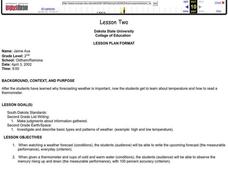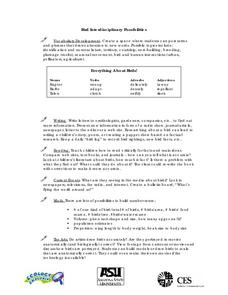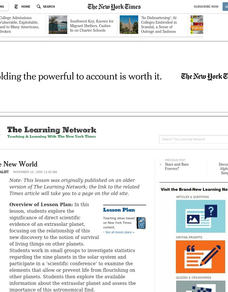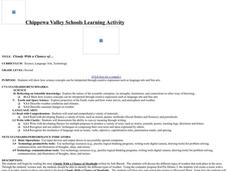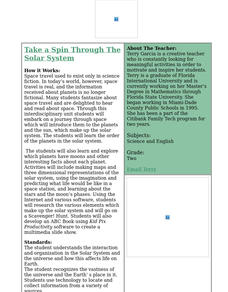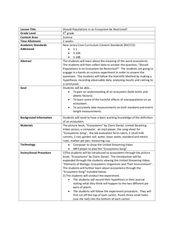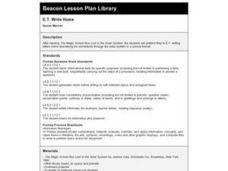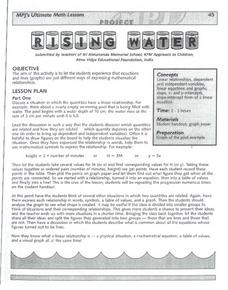Curated OER
Lesson Two
Second graders, after assessing why forecasting weather is important, study about temperature and how to read a thermometer. They experiment being able to observe the mercury rising up and down when given a thermometer and cups of cold...
Curated OER
Bird Interdisciplinary Possibilities
Students explore birds, their territory, breeding, and seasonal movement. They research and collect information on birds through writing letters to ornithologists, reading in books, comparing web sites, and observing pictures. Students...
Curated OER
Are You What You Eat?
Students observe what happens to the pigment of the Manduca when food coloring is added to their diet. They discuss how coloration affects their lifestyle. They answer questions to complete the lesson.
Curated OER
The Water Cycle
First graders investigate the different stages of the water cycle. They conduct Internet research and complete a water cycle WebQuest. Students identify what happens at each stage of the water cycle, and write about each stage in their...
Curated OER
Become a Member of the Mission to Mars Team
Students examine the various jobs of the Mars Mission Team, organize them into categories and write a formal application for a position on the Mars Mission. Entries are made into the logbook and on-line Field Journals read.
Curated OER
Bouncing Sunlight
Third graders use flashlights and balls to demonstrate how the light bounces off of the sun and reflects onto the moon. They record their observations in a journal.
Curated OER
The Wrights' Flight: History Through Primary Sources
Students read primary source material about the Wrights' first flight such as a journal and a telegram. In this The Wrights' Flight lesson, students select the most reliable primary source and compare the pros and cons of using primary...
Curated OER
The Sun and Moon
Young scholars understand basic concepts about Earth, the Sun and the Moon,
such as relative movement and the phases of the moon. Through discussion, looking at pictures, listening to Native American stories, observing, and building...
Curated OER
Air Is there
Students experiment to observe air and its mass. In this air lesson, students use the scientific method to complete experiments that demonstrate the properties of air. Students view a video as follow-up.
Curated OER
Stellar Discoveries That Are Out of This World
Students hear of the recent discovery of a group of planets orbiting the star Upsilon Andromedae. Each student create a page about an element of the universe,
Curated OER
Jackie Gore
Middle schoolers identify the amount of heat given off by solar energy. In this solar energy lesson, students complete an experiment using soil and sand measuring the heat from solar energy.
Curated OER
A Whole New World
Young scholars work in small groups to investigate statistics regarding the solar system and participate in a 'scientific conference'. They explore available information about the extrasolar planet and assess the importance of this...
Curated OER
Cloudy With a Chance of...
Second graders will write a story. In this writing and meteorology lesson, 2nd graders read the story Cloudy With a Chance of Meatballs, then use KidPix to create a weather picture. The picture is imported into a word processor and the...
Curated OER
Habitat Awareness
Second graders build a habitat. In this wildlife activity, 2nd graders work in groups to build a mammals habitat. They share their habitat with the class.
Curated OER
Parasite Development and Life Cycle
If you are new to teaching agriculture classes, this outline may be helpful when you are preparing a lecture on parasites in livestock. In addition to lecturing on this topic, the lesson plan suggests that learners research the life...
Curated OER
Take a Spin Through the Solar System
Second graders participate in a variety of activities to explore the Solar System in this unit.
Curated OER
Should Populations in an Ecosystem be Restricted?
Fourth graders experiment to determine how overpopulation effects ecosystems specifically plants. In this ecosystem instructional activity, 4th graders conduct an ecosystems experiment after listening to Claire Daniel's, Ecosystems. They...
Curated OER
E.T. Write Home
Students read the book, The Magic School Bus Lost in the Solar System, and discuss the planets visited by the characters in the book. They write journal entries from the viewpoint of E.T., writing letters home describing his travels in...
Curated OER
Technically Speaking
Young scholars research how various forms of technology have changed during different time periods and the ways in which technology impacts society. They propose designs for galleries within a technology museum.
Curated OER
The Halls are Alive with the Sound of Music
Students discuss physical places in which had good or bad acoustics. After reading an article, they discover the relationship between the physics of sound and concert hall acoustics. They calculate the speed of sound and compare their...
Curated OER
Building an Underwater Habitat
Students investigate underwater habitats. In this underwater habitat lesson, students study Aquarius and design their own underwater habitat that can sustain life. Students work in groups and present their habitats to the class. Students...
Curated OER
How about a Little Give and Take?
Middle schoolers design a closed system to test the relationships between plants and animals. They monitor abiotic fluctuations within this living system by using a chemical test kit. They observe how living organisms respond to...
Curated OER
Arthropods at Home- Spider, Isopod, or Any Arthropod
Students design a habitat for an arthropod. In this organisms lesson, students read the book, A House is a House For Me. Students find an arthropod and create a terrarium.
Curated OER
Rising Water!
Students observe water change from a liquid to a gas state when heated and then return to its liquid stage when cooled. They learn that gas molecules move faster than liquid molecules. They discover physical properties that describe how...
